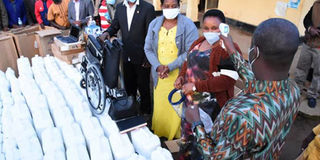Government clears schools with SOPs for reopening

Ruhinda North MP Thomas Tayebwa demonstrates to teachers how the thermometer gun works. Photos | Alex Esagala
What you need to know:
- However, he added that they will be able to ascertain those which were operating both day and mixed schools after analysing all reports. The government directed that only day or boarding schools will be allowed to reopen but not both.
The government yesterday said majority of schools have complied with standard operating procedures (SOPs) and have been given certificates of compliance.
In areas where schools did not meet the standards, the schools were given two weeks to rectify them before another inspection.
In Mitooma District, for example, at least 227 of its schools have been cleared to reopen, while 13 did not qualify.
The Mitooma District Education officer (DEO), Ms Peace Gloria Barungi, said: "It is true not all schools were 90 per cent prepared when we visited them on Saturday. Some lacked temperature guns, others did not implement the other SOPs. These 13 schools include 11 primary schools, one secondary school and a tertiary institution."
Ms Barungi was speaking while handing over; temperature guns, masks, face shields among other equipment donated by the Ruhinda North MP Thomas Tayebwa, to help schools meet the SOPs.
"This is a big push, I believe if we continue to have such, there is no school that won't reopen. I thank Mr Tayebwa for this very big initiative to boost our schools," she said.
Mr Tayebwa assured his constituents that all schools and places of worship in his constituency will be reopened.

"Today we have given out 200 temperature guns, 400 masks and face shields, 200 jerrycans of five litres and 50 jerry cans of 20 litres anti-bacterial hand wash to schools, churches and mosques. Our aim is that no school, no place of worship should be closed in Ruhinda North because we don't have or don't follow the SOPs," the MP said.
He appealed to headteachers in Mitooma to act exemplary to students in observing the Ministry of Health guidelines in the fight against Covid-19.
Meanwhile, Mr Benson Kule, the commissioner directorate of education standards, said it was easy for the educational institutions to handle only candidates.
“Pallisa District, for example, had 116 of its schools cleared to reopen tomorrow compared to 13 which did not qualify while Pakwach had seven schools not cleared. The purpose of the inspection was to see whether candidates can begin. Overall view now is good. Most schools have prepared. I can say 90 per cent had SOPs,” Mr Kule said.
However, he added that they will be able to ascertain those which were operating both day and mixed schools after analysing all reports. The government directed that only day or boarding schools will be allowed to reopen but not both.
Entebbe principal education officer Daniel Ndaga said 90 per cent of their schools qualified for the certificate of compliance for them to start.
“Some schools have all requirements in place. There are others that have a few and we will give them a week to put them in place,” Mr Ndaga said.
Of the 52 primary schools in Entebbe, 48 complied while of the 13 secondary schools, seven had the necessary requirements.
“We need to send an early warning, if you don’t qualify you need to advise your candidates to enrol in a school that qualifies with the SOPs in place. We need to advise parents to enrol students in qualified schools to avoid inconvenience since registration of candidates will be done by mid-November,” he said.
The inspectors were looking at whether schools have handwashing facilities, soap, water, isolation rooms and enough space to allow social distancing, among the learners.
The inspectors, however, could not demonstrate the guarantee that learners who were in schools with mixed day and boarding will be catered for. In addition, the spacing in classes will require more teachers, which schools, especially private investors had complained was going to be costly with only one class at school.
Appeals to government to support the private sector was unsuccessful. The government insisted there was no money to honour the request but offered Shs22b to supplement the teachers’ welfare as they managed to wade through the lockdown. The money though hasn’t been received.
It is not clear how schools mobilised money to put in place the SOPs after seven months without working.
Alex Esagala, Paul Adude & Patience Ahimbisibwe




